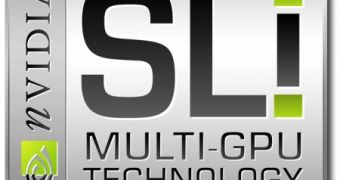Nvidia has released some new technical specifications regarding their upcoming Hybrid SLI technology, designed to boost graphics performance by mixing integrated graphics with a discrete graphics card. This not only that allows increased graphics computing performance, but also helps saving energy. When the system works under full load, both discrete and integrated graphics processors are active, but when performing regular tasks, the discrete graphics processor shuts down.
The first desktop boards supporting the upcoming Hybrid SLI technology are set to arrive on the market during the first quarter of the year. Just like AMD's hybrid graphics, Nvidia's technology primarily aims at low-end, low-performance graphics cards. The multi-GPU approach is alleged to increase the graphics computing performance and offer low-end card owners the opportunity of decently playing some mid-range game titles on their inexpensive graphics cards.
The Hybrid SLI technology is comprised of two components, The GeForce Boost and the HybridPower. The GeForce Boost technology is Nvidia's performance-enhancing component that allows the chipset to combine its own graphics data with data received from a discrete graphics card (via SLI), then route it via the PCI-Express 2.0 interface to either one, or to multiple monitors. This feature will be generally available on all Nvidia's upcoming chipsets, including the nForce 780a, 750a and 730a.
However, Nvidia said that the performance improvement will be modest, yet it will become an effective and cheap method to enhance the graphics performance, even when using a low-end card. The HybridPower technology will play an important role on both desktop and notebook PCs. The discrete graphics component will be able to kick in each time it is required, but will shut down afterwards, in order to preserve the battery life. The HybridPower option will only be available beyond the 8200 generation of chipsets.

 14 DAY TRIAL //
14 DAY TRIAL //